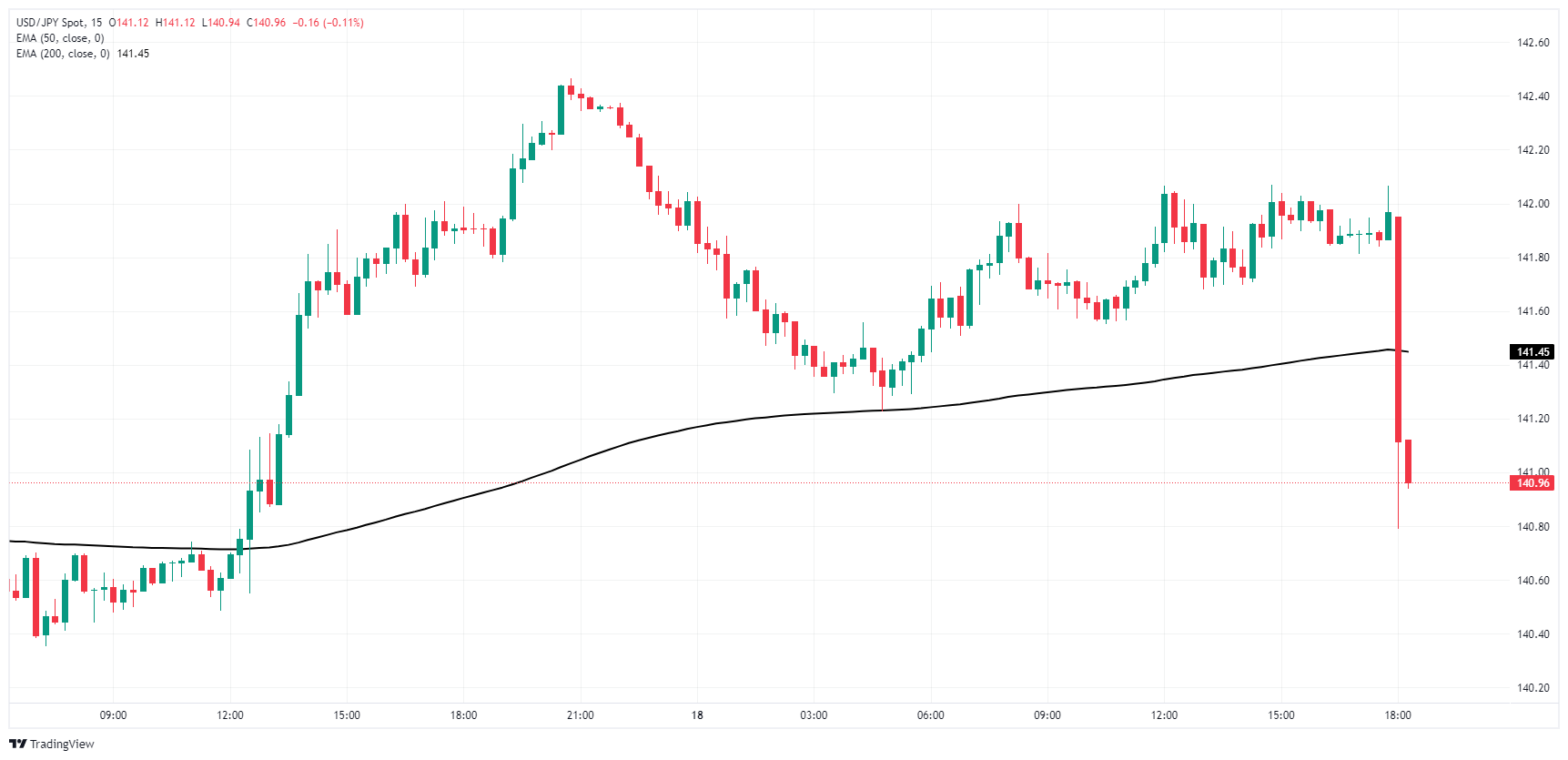- Analytics
- News and Tools
- Market News
- USD/JPY plunges after Fed delivers 50 bps rate cut
USD/JPY plunges after Fed delivers 50 bps rate cut
- USD/JPY dips on reaction to 50 bps Fed rate cut.
- Fed's dot plot on rate outlook also declined.
- Markets await Fed Chair Powell's press conference appearance.
USD/JPY plumbed the depths of 140.80 on Wednesday after the Federal Reserve (Fed) dropped a 50 bps rate cut on markets. This marks the Fed's first rate cut in over four years as US central bank policymakers race to catch up to market expectations. Investors had initially hoped for a first rate cut from the Fed in March.
The Federal Reserve's dot plot, part of the Federal Open Market Committee's (FOMC) Summary of Economic Projections, has been revised downward from the central bank's previous rate outlook. The median policy expectations from the Fed now indicate that the Fed Funds rate is projected to be 4.4% by the end of 2024 and 3.4% by the end of 2025, down from 5.1% and 4.1% respectively.
Digging deeper into the Fed's notes, Fed policymakers now anticipate US Gross Domestic Product (GDP) growth to remain at 2.0% through 2024, down from the previous projection of 2.1% in June. Fed officials also expect the US Unemployment Rate to settle around 4.4% by the end of 2024.
With the Fed aligning with market expectations for rate cuts, global markets are now turning their attention to Fed Chair Jerome Powell's press conference scheduled to take place shortly.
More to come...
USD/JPY 15-minute chart
Japanese Yen FAQs
The Japanese Yen (JPY) is one of the world’s most traded currencies. Its value is broadly determined by the performance of the Japanese economy, but more specifically by the Bank of Japan’s policy, the differential between Japanese and US bond yields, or risk sentiment among traders, among other factors.
One of the Bank of Japan’s mandates is currency control, so its moves are key for the Yen. The BoJ has directly intervened in currency markets sometimes, generally to lower the value of the Yen, although it refrains from doing it often due to political concerns of its main trading partners. The current BoJ ultra-loose monetary policy, based on massive stimulus to the economy, has caused the Yen to depreciate against its main currency peers. This process has exacerbated more recently due to an increasing policy divergence between the Bank of Japan and other main central banks, which have opted to increase interest rates sharply to fight decades-high levels of inflation.
The BoJ’s stance of sticking to ultra-loose monetary policy has led to a widening policy divergence with other central banks, particularly with the US Federal Reserve. This supports a widening of the differential between the 10-year US and Japanese bonds, which favors the US Dollar against the Japanese Yen.
The Japanese Yen is often seen as a safe-haven investment. This means that in times of market stress, investors are more likely to put their money in the Japanese currency due to its supposed reliability and stability. Turbulent times are likely to strengthen the Yen’s value against other currencies seen as more risky to invest in.
© 2000-2026. All rights reserved.
This site is managed by Teletrade D.J. LLC 2351 LLC 2022 (Euro House, Richmond Hill Road, Kingstown, VC0100, St. Vincent and the Grenadines).
The information on this website is for informational purposes only and does not constitute any investment advice.
The company does not serve or provide services to customers who are residents of the US, Canada, Iran, The Democratic People's Republic of Korea, Yemen and FATF blacklisted countries.
Making transactions on financial markets with marginal financial instruments opens up wide possibilities and allows investors who are willing to take risks to earn high profits, carrying a potentially high risk of losses at the same time. Therefore you should responsibly approach the issue of choosing the appropriate investment strategy, taking the available resources into account, before starting trading.
Use of the information: full or partial use of materials from this website must always be referenced to TeleTrade as the source of information. Use of the materials on the Internet must be accompanied by a hyperlink to teletrade.org. Automatic import of materials and information from this website is prohibited.
Please contact our PR department if you have any questions or need assistance at pr@teletrade.global.















